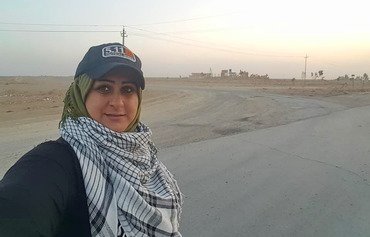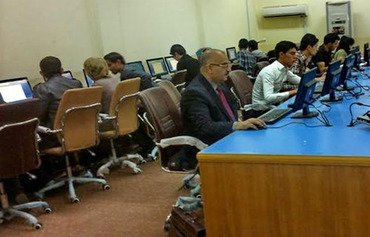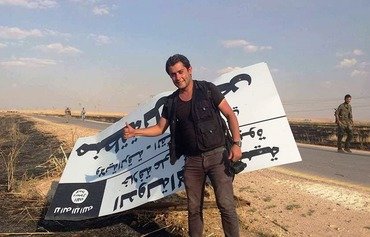The Diyala branch of the Iraqi Journalists Syndicate recently began an initiative to support the Iraqi forces in their battle against the "Islamic State of Iraq and the Levant" (ISIL) which will send some reporters to the front line in Fallujah.
The National Writers Convoy, launched May 28th, plans to organise field trips to send Diyala journalists, media professionals and writers to the battlefront, said Diyala branch head Sajid al-Mahdawi.
Participants would "conduct interviews with the fighters and write about the course of the battles, documenting their observations and stories in sound and video", he told Mawtani.
"We, as journalists, writers and intellectuals in the province, want through this initiative to deliver a message of support to our troops in the army, police, popular mobilisation and tribesmen," he said.
"We wanted to tell them 'We stand with you in the same trench and will not abandon you'," he added.
"This battle is not a battle of weapons only, rather one of weapons and pens together," he said. "It is our national, ethical and professional responsibility to stand with our troops, highlight their sacrifices and triumphs and contribute to raising their resolve to fight terrorists."
Countering ISIL's propaganda
The initiative serves to counter the "deliberate distortion of facts" propagated by some websites, satellite channels and journalists who are trying to sow sectarian strife by fabricating news to influence the course of the battle, al-Mahdawi said.
War reporters from Diyala are currently covering the battles in Anbar and Salaheddine provinces "with all credibility", he noted.
The new campaign aims to facilitate greater media coverage that will serve to counter the distortion of facts, he said.
It will expand the sources of information available to the public inside and outside Iraq, and shed light on what is actually happening on the ground, said Hassan Aboudi, a member of the Iraqi Journalists Syndicate Council.
"Today we are faced with a media attack by terrorists and their supporters, and the dissemination of false news and information for the purpose of propaganda and psychological pressure," he told Mawtani.
The National Writers Convoy will respond to ISIL's attempts to weaken the morale of Iraqi fighters and create the illusion of a sectarian battle, he said.
"We ask all workers in the fields of media, journalism and culture to advocate for our troops and the popular mobilisation, by publishing news of their victories and humanitarian stories about saving civilians in combat zones, in addition to monitoring and documenting all the crimes of the terrorists," he added.
Protecting war reporters
The syndicate is keen to protect the lives of war correspondents, Aboudi said.
"They are more vulnerable to targeting by ISIL, which considers a journalist its arch foe because he reveals its truth and the falsity of its allegations," he added.
"There is a joint programme with the International Federation of Journalists to train Iraqi war correspondents on how to protect themselves in the battlefield and face emergency situations," he said. "We have, so far, organised dozens of training courses in this field at the hands of experienced experts."
Iraq is now facing a critical showdown with ISIL, a group "that has committed a lot of atrocities and is still committing more", Iraqi press freedoms watch head Ziad al-Ajili told Mawtani.
As the battle intensifies, he added, "we need a larger media effort to expose the truth about these terrorists and their brutal practices, in addition to professional coverage of the battles that conveys facts and refutes rumours".
All reporting "characterised by impartiality and credibility is a victory for the Iraqi media" al-Ajili said.
"Reporters traveling with security forces defy danger in order to deliver the truth to the people," he said, stressing the need to protect them as they work.
Three Iraqi reporters have been injured while covering the battle since the start of the operation to liberate Fallujah, he added.

![Iraqi war correspondent Alaa Eidani, who was injured while covering the battle against the 'Islamic State of Iraq and the Levant', conducts an interview on a Baghdad street. [Photo courtesy of the Iraqi Ministry of Defence]](/cnmi_di/images/2016/06/15/5624-Iraq-war-correspondent-600_384.jpg)






